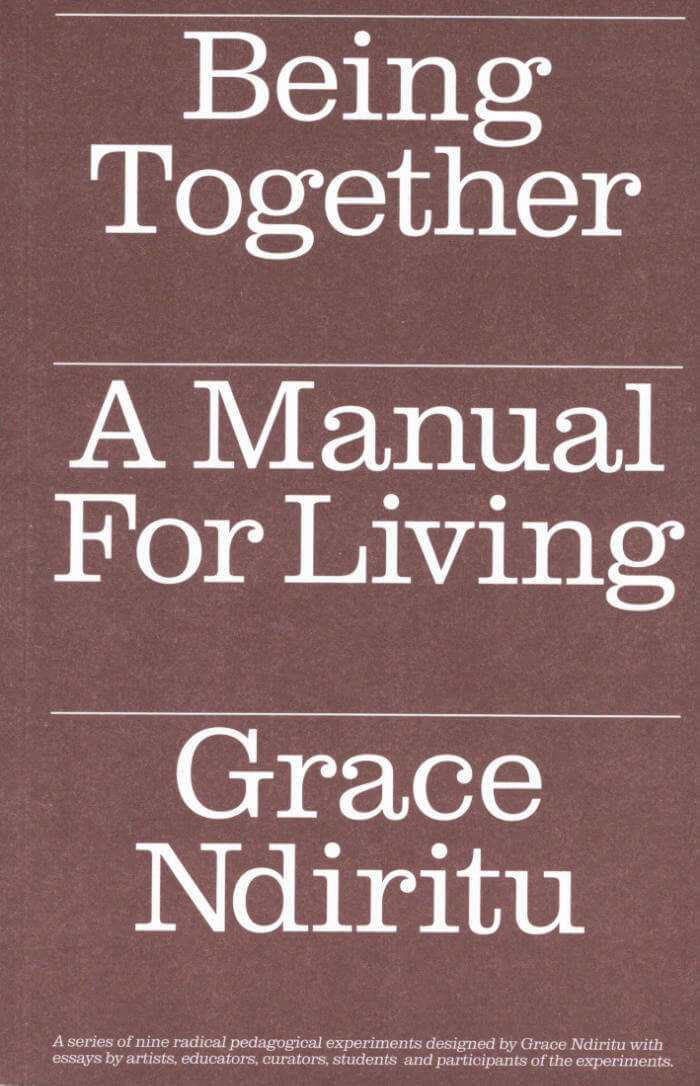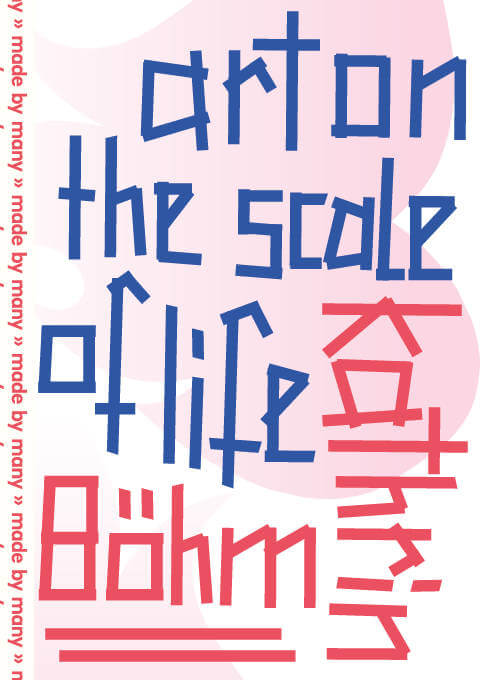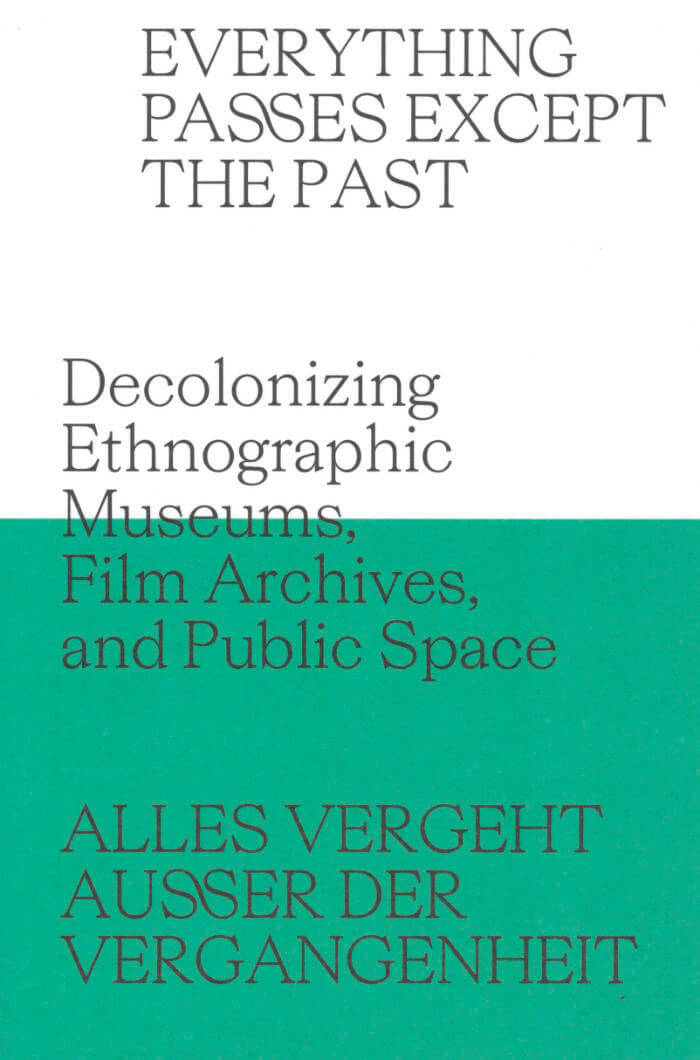Grace Ndiritu
Grace Ndiritu

Being Together. A Manual for Living
Being Together: A Manual For Living falls in the lineage of publications such as The Journal of the Society for Education Through Art, which throughout the 1960s provided Britisch art schools a window into experimental education. By contrast, Grace Ndritu's experience in creating radical pedagogies arose from a connected, yet unorthodox system of 'self education'.
In 2012, she decided to spend time living in cities only when necessary. She thus lived in rural, alternative and often spiritual communities, while expanding her research into nomadic lifestyles, and training in esoteric studies, which she began following graduating art school. This research led her to visit Thai and Tibetan Buddhist monasteries, permaculture communities in New Zealand, forest tree dwellers in Argentina, neo-tribal festivals such as Burning Man in Nevada, a Scottish Hare Krishna ashram, and the Findhorn Spiritual Community in Scotland.
Such lifestyles forever transformed her ideas of education and have proven critical for her art, whether conducting social practices or working with students, peers and the general public; some of whose voices appear in this publication. Ndiritu posits, "What does (art) education mean today?" and specifically, "What does an embodied (art) education mean in a time of pandemics and social unrest?". Being Together: A Manual For Living attempts to answer these complex questions.
This book is published on the occasion of Grace Ndiritu's solo show at KRIEG? in Hasselt, Belgium.
Contributors: Philippe Van Cauteren, Pieter Vermeulen, Grace Ndiritu, Rafaela Lopez, Roberto dell’Orco, Jana Haeckel, Katleen Vermeir & Ronny Heiremans, Nathalie Boobis, Shayla Perreault, Edward Ball, Guadalupe Martinez, Stacy Suy, Ezra Fieremans.
Editors: Pieter Vermeulen, Grace Ndiritu
Copy editor: Sue Spaid
Design: Vrints-Kolsteren

Dissent Without Modification
Dissent Without Modification is a research book composed of interviews with radical and progressive artists and thinkers, who started their education and careers in the 1990s. Some are well-known, some are not. They are African, European, and American women working as painters, photographers, performers, hackers, activists and educators, among other roles such as Lisha Sterling, Monster Chetwynd and Kathrin Böhm.
What connects these brilliant women together, now in their late thirties, mid forties, early fifties and sixties; is that the decade of the 1990s had a culturally significant impact on their politics, career and personal life choices. The decade represented a creative coming of age for them all and their lives changed forever. The consequences of those changes are still reflected in their distinctive thoughts and practices today.
The long format interviews that comprise Dissent Without Modification are casual, meandering, philosophical conversations with a wide ranging appeal. Each person’s character is slowly revealed within a backdrop of humour, while touching on many serious universal and global subjects. Topics include pedagogy, race relations, neo-paganism, sexual violence, class warfare, interracial marriage, ecological feminism, contemporary slavery, activism, extreme tourism, African politics, terrorist practice in Western democratic states, and much more.
Published 2020
And more

Art on the Scale of Life
A comprehensive overview of artist Kathrin Böhm's multifaceted, deeply collaborative, and durational practice and networks.
This volume critically profiles, contextualizes, and theoretically elaborates the unique practice of the UK-based German artist Kathrin Böhm. Combining visual and textual material, it offers an overview of Böhm's exceptional modus operandi that is rooted in a highly original artistic synthesis of a range of practices. Over the last three decades, Böhm has expanded the terms of socially engaged ways of working to an unprecedented scale and breadth by producing complex organizational, spatial, visual, and economic forms. These often entail the production of complex infrastructures, manifested via projects such as Culture is a Verb (2018–21), The Centre for Plausible Economies (2018–ongoing), Company: Movements, Deals and Drinks (2014–ongoing) and the Eco-Nomadic School (2010–ongoing). The book follows a major mid-career exhibition at The Showroom, London, in 2021.
Offering a significant addition to debates on contemporary art and architecture, social action, and public culture, Kathrin Böhm: Art on the Scale of Life brings together critical reflections by internationally acclaimed contributors. Spanning a wide range of critical positions and disciplines, these include Dave Beech, Céline Condorelli, Elvira Dyangani Ose, Wapke Feenstra, Katherine Gibson, Joon-Lynn Goh, Lily Hall, Yolande Zola Zoli van der Heide, Grace Ndiritu, Gerrie van Noord, Paul O'Neill, Doina Petrescu, Gregory Sholette and THEMM!!, Kuba Szreder, Gavin Wade, Mick Wilson, Stephen Wright, and Franciska Zólyom. In addition, material derived from Böhm's international networks and projects provides an in-depth impression of the deeply ingrained collaborative and durational nature of her way of working.
Photographic, diagrammatic, and typographical imagery runs through the book, demonstrating the rich visual and spatial languages embedded in Böhm's work. This visual register of the book is therefore much more than a series of illustrations and acts as a counterpoint to, and extension of, the ideas elaborated in the texts.
Kathrin Böhm is an international artist based in London. Her work takes place in and outside the art world, as she engages with governance, economics and different trans-local communities. Her main interests are the collective (re-)production of public space, trade as public realm and the everyday as a starting point for culture.

Everything Passes Except the Past – Decolonizing Ethnographic Museums, Film Archives, and Public Space
Everything Passes Except the Past takes an artistic and discursive approach to coming to grips with a colonial past that remains present in ethnographic museums, public space, and image archives.
The contributions in this book propose visionary theoretical, practical, and ethical foundations for future museums based on artistic and curatorial remediation of ethnographic collections. They also cover the role of colonial films in our collective and national memory, as well as the challenges and perspectives of tearing down or replacing monuments and renaming streets.
Contributions by Yaa Addæ Nantwi, Lotte Arndt, Andrés Antebi Arnó, Bianca Baldi, Daniel Blaufuks, Filipa César, Didi Cheeka, Clémentine Deliss, Karfa Diallo, Sally Fenaux Barleycorn, Alessandra Ferrini, Fradique, Pablo Gonzáles Morandi, Guido Gryseels, Jana J. Haeckel, Didier Houénoudé, Duane Jethro, Christian Kopp, Yann LeGall, Alberto López Bargados, Eloy Martín Corrales, Grace Ndiritu, Inês Ponte, Linda Porn, Tamer El Said, Bénédicte Savoy, Stefanie Schulte Strathaus, Mnyaka Sururu Mboro.
Graphic design: Caroline Wolewinski.